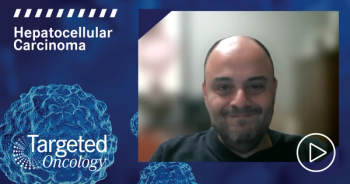
Phase 3 REFLECT Trial in Unresectable HCC
Dr Ghassan K. Abou-Alfa provides insight from the results of the REFLECT trial comparing sorafenib vs lenvatinib in patients with unresectable HCC and comments on the safety profile of lenvatinib.
Ghassan K. Abou-Alfa, MD, MBA: When we cross over to the discussion of sorafenib-lenvatinib, we know very well that this was a noninferiority study that looked into sorafenib vs lenvatinib. It was intriguing. Our colleagues who did this study were thinking ahead of the curve. I had some discussion with some of them, and by all means give them credit for that. They said if survival from the tyrosine kinase inhibitor [TKI] is about 12 to 13 months, we don’t think that lenvatinib is going to improve it. It’s the same class of drug. As such, both sorafenib and lenvatinib are going to run exactly the same distance on the racetrack. That is where the noninferiority is coming from.
They showed that after all, the median overall survival for lenvatinib was 13.6 months and for sorafenib was 12.3 months. No difference at all. The hazard ratio was 0.92. This is a positive study because this is exactly the answer to the question they want. Intriguingly, they said to themselves that even though we’re running the same distance on the same field, let’s see if lenvatinib is a faster runner. How do you do that? You depend on the biology. If anything, lenvatinib will be able to target anti-VEGF. That’s the same as sorafenib, but it also has a bit more potential to target FGF, which is a critical component and a key player in regard to the development of liver cancer. The IC50 [half-maximal inhibitory concentration] for the targeting of the VEGF is way lower for lenvatinib compared with sorafenib, which ironically makes the dose of the lenvatinib much lower, at 12 mg.
Interestingly, the FGFR inhibition requires a way-too-low IC50 for the lenvatinib, when you need grams of sorafenib to be able to target it. It translated in improvement of progression-free survival. Lenvatinib was 7.4 months; sorafenib was 3.7 months, almost 3 times higher. Not only that, but there was a very robust response rate, which was close to 25% in regard to RECIST 1.1 for lenvatinib and close to about 42% for modified RECIST evaluation for lenvatinib.
The 3 choices are available to us—sorafenib, lenvatinib, and atezolizumab plus bevacizumab—but we can definitely say that we all tried sorafenib. I have to give credit: We’ve been involved from day 0 with this effort. If anything, it definitely has a lot of value for the patients. Sadly, though, the adverse events are a little bit of a limitation. Of course, the robust response is not that apparent. On the other hand, atezolizumab plus bevacizumab had amazing results with improvement in survival, but at the same time was a risk in regard to the potential bleeding with bevacizumab. There’s also the antidrug antibody, which we recently heard can occur in about a third of the patients. This will really render the sorafenib, and indirectly lenvatinib, as good as atezolizumab plus bevacizumab.
As such, the robust response of the lenvatinib with a tripling of the progression-free survival and major increase in response would make it an appropriate choice. I’m not surprised this patient was given lenvatinib. Clearly the physician thought very carefully about their assessment and applied it accordingly. The NCCN [National Comprehensive Cancer Network] Guidelines do present all 3 options. Understand they are guidelines. They’re not going to tell us what to do, but they’ll present to us what can be done. Then we use our logic and understanding of the information to decide what’s best for our patients.
With this experience with the lenvatinib, what about safety? I already alluded a little to the sorafenib with the hand-foot syndrome that can occur. It can occur with all the TKIs, including lenvatinib, but way lower potential compared with sorafenib. At the same time, the patient has hypertension, which we’ve heard but is easily controlled. There’s no doubt it can become an adverse event in the use of lenvatinib. But in general, it’s easily controllable with the appropriate antihypertensives.
Proteinuria can occur. Doctors are differing. Some of them check UI [urine protein] at the start, while others don’t. It will depend on the patient’s hematology. Thankfully, it’s rare either way. Weight loss and decreased appetite might occur. It’s a good idea to monitor these things carefully. Thankfully, making small changes to the diet and ensuring meals are small and frequent can help circumvent that easily. In general, I would say that lenvatinib would be an appropriate option of therapy, especially for patients like the 1 who was presented to us.
Transcript edited for clarity.





















